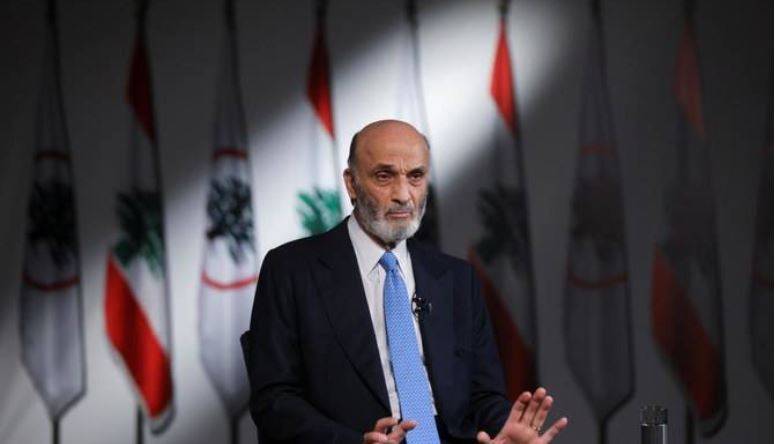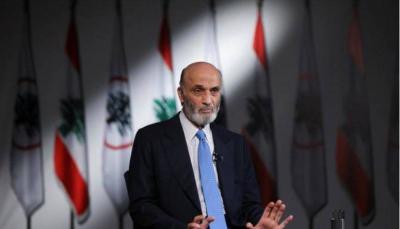Between the "great bet" that the upcoming electoral entitlement could be a pivotal moment to save the Lebanese people from the grip of the ruling majority, and the "great bet" on the supportive Arab environment to aid the Lebanese in confronting the exacerbating crises they face—economically, socially, and in their daily lives—Samir Geagea, the head of the Lebanese Forces Party, balances his approach to the internal situation, emphasizing that hope is lost with the current authority in saving the country and its citizens.
In response to a question from "Nidaa al-Watan" about what should be done to salvage the situation in Lebanon, Geagea stated: "The situation in Lebanon is extremely complicated, and the recent Ukraine crisis has further complicated and worsened it due to price increases in many consumer goods, foremost among them fuel and bread, along with other basic living commodities. Everyone knows that despite the ongoing discussions with the International Monetary Fund, no results can be expected except after the May 15 elections. The radical and effective solution, for us, can only be an actual change in the current parliamentary composition, and from here we have a great bet on the May 15 elections. But should we leave the Lebanese people in the ocean of pain and suffering until May 15? Of course not, but at the same time, I do not rely in any way on the current authority."
So what is to be done? Geagea responds: "In my opinion, there is only one solution, and this is what historically saved Lebanon in every crisis it has gone through, which is the assistance of our Gulf brothers, headed by the Kingdom of Saudi Arabia. For this very reason, I urge the Saudi leadership and all Gulf leaders to return to Lebanon, because the Lebanese people are practically abandoned at present, and because the Lebanese people urgently need their customary assistance to navigate this difficult phase." He continued: "I urge the Saudi leadership and all Gulf leaders to reconsider their position on Lebanon, not out of conviction in the current authority, of course, but in faith in the Lebanese people. Other than that, I do not see any glimmer of hope before the parliamentary elections, and may the May 15 elections, if God wills, bring forth the hoped-for change."
On the other side, the head of the Free Patriotic Movement, Gebran Bassil, translated the state of "twinning" between his party and Hezbollah in the clearest electoral form, reflecting the reality of full and comprehensive fusion between them on various issues and proposals, culminating in Bassil replicating Hezbollah’s slogan "We will remain," as he also raised the slogan "We will stay." He went further in the pattern of emulation and replication by following the footsteps of the "July 2006 political war" declared by Hezbollah in opposition to the forces of change and opposition, announcing in turn a "war of economic liberation" in 2022, akin to the failed "sovereign liberation war" led by the Free Patriotic Movement in 1989, which ended with the country being delivered to Syrian tutelage.
Today, Aoun and Bassil count on the same "weapon" to secure as many seats as possible for the National Movement in Parliament, starting from the affirmation by the head of the Movement yesterday of the electoral unity between both sides when he stated: "Whoever extended their hand for electoral alliance is Hezbollah." Under the roof of this alliance, Bassil appeared in his speech during the March 14 conference yesterday as if drawing from Hezbollah's teachings, quoting its slogans and ideologies in addressing opponents and inciting against them by categorizing the Lebanese people into "national" and "traitor," allowing his electoral campaign to overflow with terms of "denigration and treason," sparing no party, group, or individual outside the circle of his ally Hezbollah from accusations based on the premise that "everyone is corrupt, lying, criminals, traitors, and collaborators in the country except us."
In this context, Bassil saw himself embodying the "original and genuine March 14" against "the forged and false March 14 of 2005," and "the sincere revolution against the false revolution of October 17," labeling the Lebanese "national" model against the "collaborator" model, accusing civil society groups of being funded by embassies and targeting foreign countries for refusing to cooperate with the "nationals and decent people… because they prefer to work with collaborators and thieves." He moved to attack what he described as "chameleons," stating that they change their names during elections and become organizations and associations working for one employer and one funder, warning the "chameleon party and the false October 17 revolution" that even if they win the elections and become an "illusory majority," this majority will remain incapable of "disarming Hezbollah" or preventing it from entering the government.
Simultaneously, Hezbollah continued over the weekend its electoral campaign of denigration against "the entities funded by embassies including organizations, politicians, journalists, and some parties and media institutions," without excluding the government from calling for "shutting the doors against external dictates," as Sheikh Nabil Qaouk stated, emphasizing that "Hezbollah will break American resolve on May 15 and thwart their projects and goals." Meanwhile, the head of the Loyalty to the Resistance bloc, MP Mohammad Raad, conveyed a "coded" security message to the Americans indicating that "the party" monitors the American military presence in Lebanon and is aware of its numbers "moving between Hammas and Riaq and the Awkar embassy."




